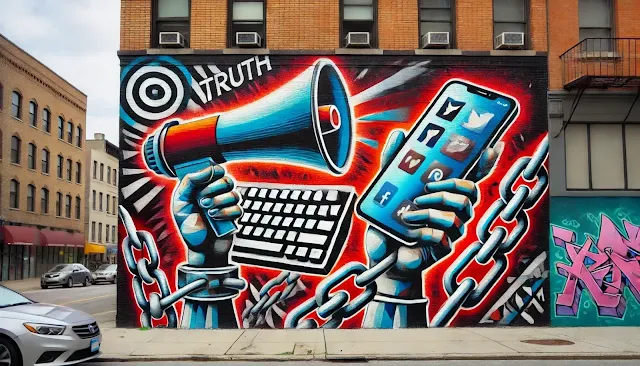Free speech. The cherished American ideal that guarantees the right to speak your mind—whether you're enlightening the masses or peddling conspiracies. But in 2025, this principle has evolved—or perhaps devolved—into something unrecognizable. Social media, the digital town square, is no longer a space for civil discourse. It’s now a battlefield where "free speech" means "I can say anything, but don’t you dare fact-check me!"
Let’s dive into the chaotic world of social media’s self-proclaimed free speech revolution and the messy reality it has created.
Meta’s U-Turn: Fact-Checking Takes a Back Seat
In a shocking plot twist, Mark Zuckerberg recently announced that Meta would ditch fact-checkers in favor of "community notes." Yes, because a Reddit-style democracy of anonymous users will surely safeguard truth. (Spoiler: It won’t.) Zuckerberg says this move restores free expression, but let’s be honest—it's a green light for disinformation super-spreaders.
This shift brings us back to January 6, 2021, when a certain orange-hued ex-president was banned from most platforms. For a brief, blissful moment, the megaphone of misinformation was muted. But fast-forward to today, and tech companies seem eager to hand the megaphone back, all in the name of "free speech." It's as if we learned nothing from that insurrection-lite event.
Elon Musk’s “Positive” Censorship
Meanwhile, over on X (formerly Twitter, now Muskville), the algorithm is being recalibrated to promote "positive" posts—translation: pro-Trump propaganda. Musk’s free speech absolutism conveniently makes room for disinformation while sidelining critiques of the powerful. It's like claiming to host a debate while unplugging your opponent’s mic.
Remember, "positive" posts don’t mean “uplifting” or “constructive.” They mean posts that bolster the narrative of those already in power. Apparently, in Musk’s world, free speech is free—as long as it agrees with the boss.
The TikTok Tango: A Conservative Takeover
And then there’s TikTok. Congress has spent years debating its future, citing security concerns. Enter Kevin O’Leary, the Canadian millionaire with a Shark Tank pedigree and a conservative bent. He’s vying to buy the platform before the Trump 2.0 administration can wield its influence. If successful, TikTok might trade dance trends for culture war tirades.
Social media, once a haven for creativity, is becoming a playground for the ultra-rich and hyper-partisan. It’s not just about controlling the narrative—it’s about ensuring the narrative serves their interests.
Corporations: Capitulating to Power
Let’s not ignore the corporations. Many promised to stand firm on values like diversity and equity after the chaos of 2021. Spoiler alert: most caved faster than a Jenga tower. Walmart, Boeing, and even McDonald’s have scaled back their commitments, proving that principles are great—until they clash with profit margins.
However, there are exceptions. Costco, for instance, stood firm, recognizing that representation isn’t just good ethics—it’s good business. But for every Costco, there’s a Jeff Bezos, eager to appease power, even if it means gutting journalistic integrity. The Washington Post lost subscribers after Bezos blocked an endorsement of Kamala Harris. The message was clear: profits over principles.
The Myth of Free Speech Absolutism
Here’s the thing about free speech: it’s not an absolute. Even the First Amendment has limits. Yelling “fire” in a crowded theater isn’t protected speech—nor should spreading dangerous lies online. Social media platforms have become digital bonfires where disinformation spreads faster than facts ever could.
Free speech doesn’t mean speech without consequences. It means creating spaces where truth can thrive, even when it’s uncomfortable. It requires accountability, something that tech moguls like Zuckerberg and Musk conveniently overlook in their pursuit of user engagement metrics.
A Call to Reflection: What’s the Real Cost?
As we celebrate another year of social media “freedom,” let’s pause and reflect. What’s the real cost of this digital chaos? Is it the erosion of trust in institutions? The normalization of hate speech? The undermining of democracy itself?
We’re at a crossroads. We can demand accountability from these platforms or let them continue to amplify the loudest, angriest voices—often at the expense of truth and equity. The choice is ours, but as always, choices have consequences.
Building a Better Digital Future
Free speech is a cornerstone of democracy, but it doesn’t thrive in a vacuum. It requires responsibility, integrity, and a commitment to truth. Social media platforms have the power to shape public discourse, but with great power comes great responsibility—or at least, it should.
As we navigate this digital minefield, let’s remember that free speech isn’t just a right. It’s a privilege that comes with obligations. And if we’re not careful, the very platforms that promise to connect us could end up tearing us apart.
What’s your take on the state of free speech in the digital age? Join the conversation below, and don’t forget to share this blog if it resonates with you. Together, we can push for a more truthful, accountable online world.













.png)


.png)
0 Comments